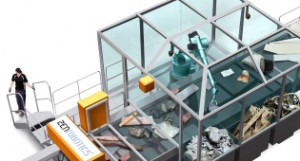Researcher: Finland needs a robotics policy
Finland should prepare for the effect robots will have on working life, say some experts in the field. They want to see a new policy on robotics and more emphasis on technology in schools.
Robot technology is developing at a rapid pace, and Finland should be ready for the changes it will bring. That’s the message from Jari Kaivo-oja, research director at the Future research centre at Turku School of Economics.

“It should be considered in the very near future,” says Kaivo-oja. ”For example in South Korea they started to consider this issue and what it means for South Korean society, which is very well-developed technologically, seven years ago. A similar approach should be taken in Finland.”
Almost half of current jobs could disappear
An Oxford University study showed that half of current jobs in the United States could be replaced by robots or artificial intelligence in the next 20 years. The situation in Finland is similar.
In addition to traditionally blue-collar occupations, many middle class professions are in the firing line. At the same time, productivity and efficiency is increasing with the help of robots. The problem could be in deciding how the advantages and disadvantages of robots are distributed in society.
If large numbers of people are left jobless as a result of robotics, it will have a knock-on effect on government tax revenues. Kaivo-ajo sees erosion of the tax base as a result of automation as a central question for society.
”Some new rules are required for tax havens, for example,” suggests Kaivo-oja. ”Then when these robots make big incomes and profits, then how will they be taxed? I think robotics provides a strong incentive for eliminating these grew economy zones.”
The researcher is seeking a new model for Finland to connect taxation and income distribution policies.
”There could be new social enterprises that operate completely differently to how companies have up to now been seen to work,” says Kaivo-oja. ””I see a lot of these kinds of challenges.”
Local manufacturing
New technology also offers many new possibilities to create jobs. Futurologist Risto Linturi of Sovelto Oy says that one of the big future trends will be local manufacturing. That means small workshops where 3D printers replace supply chains stretching across the globe. It has the potential to support employment just as robotics takes work away.
”Robotics at its best makes it possible for us all to get new machines and equipment that allows us to do useful things,” says Linturi. ”The more common robotics become, the more economies of scale disappear. Local manufacturing is a big part of that trend.”
Linturi estimates that as robots and other tools become cheaper, everyone will be able to provide themselves with employment. Such a vision does, however, require that people are willing and able to learn new things.
”If I consider 3D printing, then it demands the kind of skill that every teenage moped-rider had in school,” says Linturi. ”So the skills that were earlier taught in vocational schools. As tools improve, then these skills can be used much more efficiently. I really hope that there is a shift away from the worship of heavy industry in Finland.”
”We could begin to think that everyone has enough work if we pay enough attention to the kind of tasks that suit our expertise and where the need for capital investment is not too great.”
Linturi says that one person could for example operate around twenty 3D printers. The investment required would be equivalent to that required to buy a car. He says that policymakers should pay more attention to this kind of decentralised technology.
”One path is that we could start teaching new things properly in schools,” suggests Linturi. ”The investments currently made in these things are in the tens of thousands, whereas tens of billions are ploughed into other areas.”
Sources: Yle: http://yle.fi/uutiset/researcher_finland_needs_a_robotics_policy/6891528
